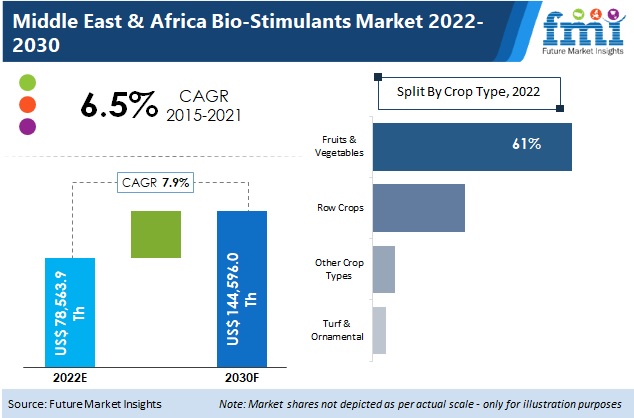The demand for organic products and methods is rising in the Middle East and Africa (MEA) as countries within the region focus on improving agricultural yield. This is in turn is driving the Middle East and Africa bio-stimulants market, finds Future Market Insights (FMI) in a new study. Customers nowadays are increasingly aware about various negative effects of using chemically synthesized pesticides and fertilizers. This has been resulting in surging sales of organic stimulants.
Bio-stimulants are produced by combining various elements such as microorganisms, enzymes, seaweed extracts, plant hormones and amino acids and are intended to boost soil fertility and plant growth. They are naturally created hormones used in soil, seeds, vegetables, and fruits, besides other crops to help increase nutrient intake, antioxidant level, water retention, chlorophyll production and metabolism.
Growing concerns regarding the environment also play a key role in the bio-stimulants market growth as these substances are used together with organic manure to increase fertility of the soil and improve plant habitat. They are being increasingly adopted due to their low ecological footprint and non-toxic properties.
Get a Sample Copy of Report: https://www.futuremarketinsights.com/reports/sample/rep-gb-12798
Key Takeaways from The Bio-Stimulants Market Report
- The MEA bio-stimulants market is expected to grow at a CAGR of 7.9% during the period of 2022-2030
- The market is expected to reach a valuation of US$ 144,596.0 Th by the end of the forecast period
- Due to their efficiency in improving yield of high-value crops and the easy application process, the demand for biostimulants will be considerably high foliar application
- Growing population along with increasing focus on sustainable farming is expected to increase drive the MEA biostimulants market
- Humic substances are expected to remain highly sought after active ingredients due to their ability to modify root morphology and plant membrane activities.
- Favorable government regulations and low labor costs have been creating lucrative prospects for growth in the MEA
“Lack of arable land and surging population will continue fuelling demand for biostimulants in the Middle East and Africa. With governments actively encouraging the adoption of sustainable agricultural practices, the demand for biostimulants will continue rising in MEA,” said a lead analyst at FMI.
COVID-19 Impact Analysis
The COVID-19 pandemic caused disruptions in several sectors including the bio-stimulants market. Implementation of lockdown in several countries caused a major slowdown in production. The restrictions on transport affected the shipment of raw materials, shutting down production of bio-stimulants.
With increasing awareness regarding health and safety, people are now shifting towards the use of organic products. This has increased demand for ecofriendly and sustainable agricultural products, increasing growth in the bio-stimulants market. The market is expected to bounce back and grow at a steady upward trajectory.
Request a Complete TOC of this Report with figures: https://www.futuremarketinsights.com/toc/rep-gb-12798
Who Is Winning?
Manufacturers are focusing on developing bio-stimulants with improved efficiency and safety to increase application in the market. Players are also collaborating with various companies to create better versions of biostimulants. For instance, In March 2020, Syngenta and SICIT Group agreed on a 15 year contract to supply HICURE and ISABION bio-stimulants with the intention to propel the use of sustainable agriculture.
Some of the key players in the bio-stimulants market are Bayer CropScience, Platform Specialty Product Corporation, Biostadt India Limited, Koppert Biological Systems, Sapec Group, Valagro S.p.A., Syngenta AG, Lallemand, Marrone Bio Innovations, AlgaEnergy, Novozymes A/S, BASF SE, Biochimica S.p.A., UPL, Isagro S.p.A. and Italpollina S.p.A.
Valuable Insights into The Bio-Stimulants Market Report
Future Market Insights (FMI) has presented a detailed analysis on the bio-stimulants market with an unbiased assessment for the years 2022-2030. In order to present a brief analysis, the MEA bio-stimulant market has been divided into several segments. The market is segmented into active ingredients based on acid-based, extract-based and others. Based on the application, the market is segmented into foliar, soil and seed. On the basis of crops, the market is classified into row crops, fruits & vegetables, turfs & ornamentals and other crop types. The MEA bio-stimulant market is segmented on the basis of geography into Egypt, Algeria, Morocco, South Africa, Nigeria, Ghana, Senegal, Tunisia, GCC countries, Turkey and Libya.
Get Customization in the Report, Enquire Now @ https://www.futuremarketinsights.com/customization-available/rep-gb-12798
About Future Market Insights (FMI)
Future Market Insights (FMI) is a leading provider of market intelligence and consulting services, serving clients in over 150 countries. FMI is headquartered in Dubai, and has delivery centers in the UK, U.S. and India. FMI’s latest market research reports and industry analysis help businesses navigate challenges and make critical decisions with confidence and clarity amidst breakneck competition. Our customized and syndicated market research reports deliver actionable insights that drive sustainable growth. A team of expert-led analysts at FMI continuously tracks emerging trends and events in a broad range of industries to ensure that our clients prepare for the evolving needs of their consumers.
Media Contact
Company Name: Future Market Insights
Contact Person: Ankush Nikam
Email: Send Email
Phone: +4420 8123 9659
Address:3rd Floor, 207 Regent Street
City: London
Country: United Kingdom
Website: https://www.futuremarketinsights.com/reports/middle-east-and-africa-bio-stimulants-market

